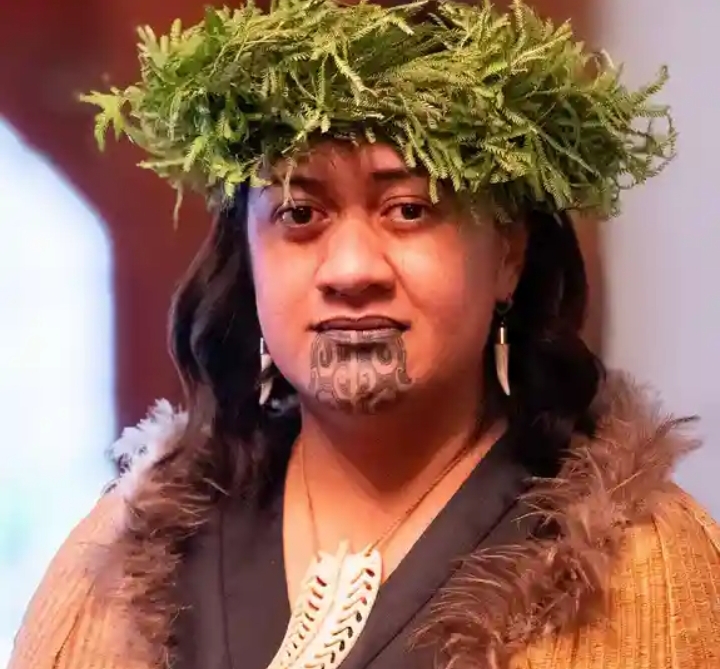The Māori council of chiefs selected Ngā Wai hono i te pō Paki, the youngest and only daughter of the late King Tuheitia, as the new monarch of the community.
New Zealand's Maori crown new queen


AFP reported that a new queen was crowned as the eighth Māori monarch in New Zealand as her father, Kiingi Tuheitia Pōtatau Te Wherowhero VII, was laid to rest. Twenty-seven-year-old Ngā Wai hono i te pō was chosen as "kuini" – the Māori word for queen – by a council of New Zealand's indigenous Māori chiefs during a ceremonial gathering in the country's North Island. She is only the second Māori queen, the first being her grandmother, Te Arikinui Dame Te Atairangikaahu.
Seated on a carved wooden throne, the new queen was announced at Tûrangawaewae Marae, the seat of the Kiingitanga or Māori king movement. She was blessed with the same Bible used to anoint the first Māori king in 1858 and sat before her father's coffin, adorned with a wreath and a cloak as prayers and chants were performed in preparation for his burial.
Following the ceremonies, a flotilla of war canoes transported the late king, who had lain in state for six days, to his final resting place on Mount Taupiri, a sacred site for the Māori people. The king, who had been recovering from heart surgery, passed away just days after celebrating the 18th anniversary of his coronation.
The selection of Ngā Wai hono i te pō as queen symbolizes a generational shift. Many view her ascension as a sign of renewal and a source of inspiration for younger members of the Māori community. The new queen holds a master's degree in Māori cultural studies and teaches kapa haka, the traditional Māori performing arts.
A haka dance was performed as part of the funeral proceedings for Kiingi Tuheitia, which were marked by elaborate and emotional moments. His coffin was then transported by waka, traditional carved war canoes, along the Waikato River before being carried up Mount Taupiri, where he was laid to rest. This marked the end of a week of formal proceedings following his death.
Rahui Papa, spokesman for the Kiingitanga movement, expressed the sorrow felt by many, stating, "The death of Kiingi Tuheitia is a moment of great sadness for followers of Te Kiingitanga, Māoridom, and the entire nation. A chief who has passed to the great beyond. Rest in love."
New Zealand's political leaders also expressed their condolences. Chris Hipkins, leader of New Zealand’s opposition Labour party, remarked, "Our country will be in mourning. He was a fantastic king with a wicked sense of humor, but also a very good man...with a real focus on bringing New Zealanders together." Prime Minister Christopher Luxon praised King Tuheitia for his dedication to both Māori and all New Zealanders, though he did not attend the funeral as he was on an official trip to South Korea.
Luxon's government has faced criticism for policies perceived by some as being anti-Māori, such as plans to reverse initiatives boosting Indigenous rights, including the closure of the Māori Health Authority, Te Aka Whai Ora, and the switch from Māori to English names for some government departments.
The official mourning period for Kiingi Tuheitia was extended from the usual three days to seven, allowing for the large number of delegations who wished to pay their respects. Māori journalist Mereana Hond shared her perspective with BBC Newsday, noting, "We have lost a king who was rising in prominence, leading all tribes of Aotearoa/New Zealand at a time when we're under a lot of political and social pressure under this coalition government."
Born Tūheitia Paki in 1955, Kiingi Tuheitia ascended to the throne in 2006 after the death of his mother, Te Arikinui Dame Te Atairangikaahu. Like his mother, he was regarded as a unifying figure, most recently calling on Māori to stand together against policies targeting their community.
The Māori monarchy was established in the 19th century when various Māori tribes sought to create a unifying figure, similar to a European monarch, in an effort to protect their land from British colonizers and to preserve Māori culture. Although largely ceremonial, the role remains a symbol of unity for the Māori people.

 বাংলা
বাংলা  Spanish
Spanish  Arabic
Arabic  French
French  Chinese
Chinese 
